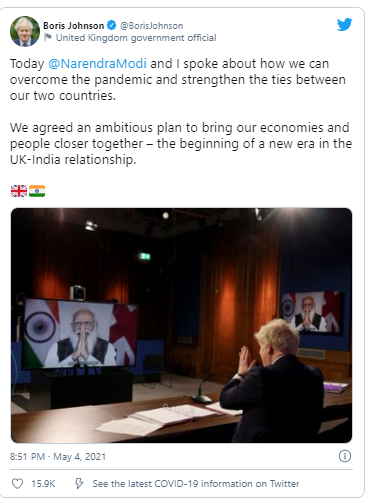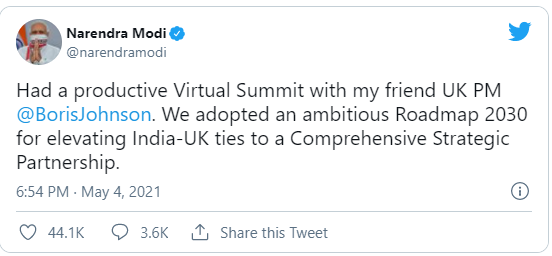
The 2030 Roadmap for India-UK future relations was launched on 4 May this year at a virtual summit between Prime Ministers Johnson and Modi. It sets out the jointly held vision for a reinvigorated and stronger relationship between the UK and India over the next ten years.
The countries’ Foreign Ministers have committed to monitoring progress on an annual basis, clearly underscoring the intent and importance attached to make the vision a reality and provide high level support to keep the plans on track.

The roadmap states that ‘The 2030 vision is for revitalised and dynamic connections between our people; re-energised trade, investment and technological collaboration that improves the lives and livelihoods of our citizens; enhanced defence and security cooperation that brings a more secure Indian Ocean Region and Indo-Pacific and India-UK leadership in climate, clean energy and health that acts as a global force for good’. This really sums up the comprehensive, broad-based and forward-looking vision of the partnership.
Connections between people of the two countries have historically been strong and will continue to be strengthened through cooperation in education, research and innovation. The priorities going forward include areas which have been of interest to the UK Higher Education (HE) sector, and the British Council along with key UK associations and bodies have been actively advocating these as well as deploying our connections and networks to see them achieved. We are pleased that our collective and coordinated efforts have helped advance some of the conversations into a more defined and tangible form.
The first one to mention is the much-awaited mutual recognition of qualifications (MRQ) which is intended to be agreed by end of 2021. The work began in December 2020 following the meeting between the UK Foreign Secretary, Dominic Raab and the Indian Union Minister of Education Ramesh Pokhriyal. This meeting led to the establishment of a taskforce comprising the various higher education sector organisation and their counterparts on both Indian and UK sides. The work is actively underway, and we expect it to reach a positive conclusion within the year.
Once MRQ is established, it will boost both inward and outward mobility in a systemic way. More Indian students will find it attractive to go to UK colleges and have the assurance that their programme degrees/diplomas/awards will be recognised in home country. It will also support the India HE sector’s initiative to increase its international student numbers from other countries. Significant uptake of TNE opportunities can be expected when these become possible to deliver as credit transferability becomes easier. The impact may be magnified because of new regulations are expected to come into effect on foreign collaboration shortly. The overall ecosystem of academics and research would stand to gain in raising of quality and standards with such exchanges.
However, the benefits of mutual recognition for student mobility to the UK may not be significant as UK degrees are already highly respected by private companies (especially multinational companies) in India even though they are not yet officially recognised by the Indian government, and these will continue to be the main employers of returning graduates even after mutual recognition opens up opportunities in the public sector (such as state-owned companies, public universities).
Mutual recognition of professional qualifications is another priority area for the two governments. At this stage, not much information is available, but we are closely watching the space and be ready to facilitate discussions with the UK sector.
The roadmap also aims at additional areas to expand cooperation between universities in line with the India’s New Education Policy (NEP) such as simplification of the education regulatory framework, embracing online courses, integrating vocational training into mainstream education and greater international collaboration. The singling out of these policy areas suggests that necessary changes will be carried out by the Indian government to enable a varied number of mutually benefitting collaborations with the UK HEIs. Showing its strong commitment towards the implementation of the NEP 2020 in letter and spirit, the Indian government has increased threshold of online delivery by the Indian HEIs to 40% and approved complete online delivery of degree courses by the top 100 Indian HEIs in the national institute raking framework for select subjects.
In February 2021, it also carried out an extensive consultation on the new draft UGC Regulations 2021 for Joint Degree, Dual Degree and Twinning Programme for academic collaboration between Indian and foreign Higher Education Institutions. This would facilitate mobility through a mutually agreed credit transfer system and collaborative models of joint delivery which get counted in award of a degree/diploma. The UK government HEIs have given their consolidated feedback through Sir Steve Smith, the Education Champion for UK. As these regulations are framed in the spirit of internationalisation as envisaged in the NEP, it will provide further impetus for India-UK Education Cooperation.
Alongside this, the British Council is working on designing a Higher Education Partnership for Teaching and Learning programme called the ‘Going Global Partnerships’. The programme to be announced shortly will focus on providing grants to collaborative partnership between two or more Indian and UK HEI’s who are planning on creating a joint delivery programme of study for UG/PG students in their respective institutions in innovative ways and forms. This will lead to a closer cooperation between UK-Indian universities and give new energy to an already strong legacy of cooperation.
The NEP also emphasises the need to make higher education a holistic and multi-disciplinary system with harnessing of vocational learning for the students. The Indian government wants to develop different pathways to integrate vocational education within HE in order to promote flexibility in movement of students from vocational programme to academic or vice versa.
As per the roadmap, new interventions can be expected to be designed to develop direct linkages and partnerships between HEIs of both countries and to promote two-way mobility of a greater number of students, teachers and researchers. The UK India Education and Research Initiative (UKIERI), embodies all of these elements in its programmatic approach and has been one of the longest serving bilateral programme. Currently in phase three of its implementation, UKIERI has contributed immensely by generating 822 partnerships, 2423 research and knowledge products and trained 25,651 learners, researchers and academics. Complementing it, is another bilateral programme – the Newton Fund, which establishes researcher links and international mobility opportunities to early career researchers through PhD placements.
Other ongoing initiatives such as GREAT Campaign, scholarships and Study UK add to these efforts. Through GREAT and Study UK campaigns, British Council carries out on-ground activities at the local level, through face-to-face to virtual engagement programmes events like fairs, roadshows, webinars etc for prospective students, capacity building for school counsellors and agents, alumni engagement and GREAT Talks (a lecture series by UK professionals). Further this year, the UK’s Turing scheme has been rolled out and we are expecting substantial engagement by the Indian universities.
Strengthening role of women in STEM (Science, Technology, Engineering and Mathematics) is highlighted as another key area of cooperation between India and UK. We are delighted to see Gender Advancement for Transforming Institutions (GATI) project mentioned in the roadmap as an example. GATI, a pilot project co-created by the British Council and the Department of Science and Technology (DST), Government of India draws inspiration from the successful Athena Swan initiative in the UK. The project aims to bring about transformational change through the creation of an Indian gender equality framework, capacity building and mutual learning partnerships between six UK HEIs and 30 Indian HE & science and technology institutions. The roadmap invokes more such partnerships which can be formed at schools, universities, and research institutions to create an enabling environment for equal participation of women in STEM disciplines.
Another gender focussed initiative was designed and launched in 2018/19 by the British Council during its 70th anniversary in India. It is called Women in STEM scholarships - a post graduate scholarship programme for Indian women who want to access UK’s renowned STEM courses but lack financial resources. This is the third year and has fully funded women on merit with proof of financial needs. The scholarship enables women to travel with their children.

India Innovation Competency Enhancement Program (IICEP) is the second British Council programme mentioned in the roadmap. It is cited as an example to highlight developing collaborations between Industry, Academia and the Government to foster innovation among school students by focusing on teacher training, mentoring and sharing of global best practices. All partners of IICEP- DST, British Council, Tata Trusts, Royal Society of Chemistry and Tata Technologies have come together to strengthen Indian government’s mandate for science and innovation. It will strengthen and improve teaching practices for science and maths at school level to create scientific enquiry and innovation environment for school students, upskill and develop capacity of early career researchers in line with international standards and industry requirements, address gender inequality for women to build their careers in STEM and produce evidence-based policy papers.
The biennial ministerial UK-India Science and Innovation Council will continue to set the agenda for the two governments’ science, research and innovation collaborations, align with wider-shared priorities and deliver in partnership. Both countries have a strong record of collaboration in research with its science and innovation infrastructure and governmental relationships. This will be further nurtured to support high-quality, high-impact research and innovation. For example, UKIERI as a joint initiative will continue to deepen the institutional linkages around convergent themes like health and artificial Intelligence, cyber physical security and waste management to address societal concerns and to create breakthrough innovations.
There is interest to explore partnership across the pipeline of research and innovation activity, between Indian and UK HEIs on mutually relevant themes of interest ranging from basic research to applied and interdisciplinary research like climate research, data science, human health, material science, environmental engineering, advance & future manufacturing, humanities and social sciences. The interest is also to take the research through to translation and potential commercialisation across government departments to optimise impact, utilise expertise and networks and promote two-way benefits. As an example, Researcher Link workshop under the Newton Fund initiative provides a unique platform to bring researchers from both countries to brainstorm on potential ideas for future collaboration and develop trusted partnerships network of researchers to exchange futuristic themes and ideas of mutual benefit.
In addition to the above, the roadmap aims to build and advance existing students, early career innovators and researcher exchanges by having a joint pipeline of talent, establishing joint centres and facilitating access to state-of-the-art facilities. This holds potential for increased opportunities for the UK sector to collaborate in the area of research skills and management, including training for early-and mid-career as well as networking and mobility opportunities. Such collaborations and networks would lead to support career development and maximise research impact.
Alongside the roadmap, various other bilateral agreements were exchanged to cement understanding and cooperation on joint government priorities. One such is the Migration and Mobility MoU, which sets out provisions for movement of students, researchers, academics and professionals in compliance with relevant immigration laws and regulations.
We indeed are in exciting times and there is lot to look forward to!
Author: Sandeepa Sahay, Coordinator, Education Insight Hub South Asia
if you have any question please write to Sandeepa.Sahay@in.britishcouncil.org

Add new comment
Please note that comments by non-members are moderated. They do not appear on the site until they have been approved. Comments by registered members appear here immediately. Your email address will not be published. All fields are required.